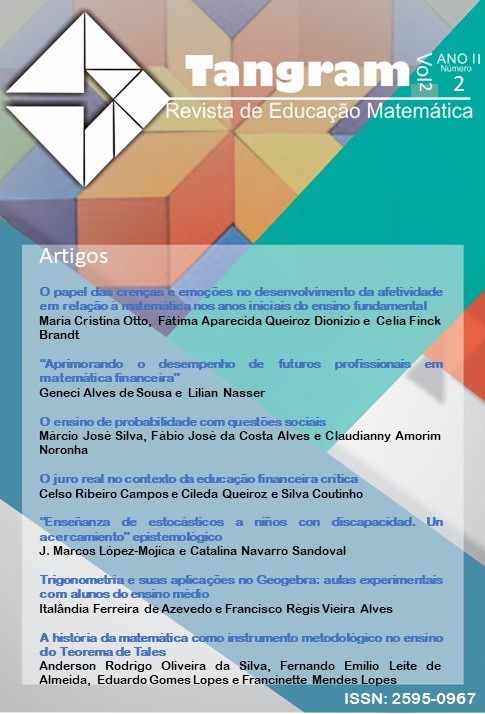O juro real no contexto da educação financeira crítica
DOI:
https://doi.org/10.30612/tangram.v2i2.8863Keywords:
educação financeira, taxa real de juro, letramento financeiroAbstract
O objetivo deste trabalho é apresentar e aprofundar o conceito de letramento financeiro dentro da sua vertente crítica e descrever uma possibilidade de desenvolvimento prático dessas ideias em um projeto pedagógico que visa discutir o conceito de juro real no dia-a-dia dos brasileiros, favorecendo a reflexão e o debate sobre as problemáticas econômicas, sociais e políticas que derivam do tema proposto. Pretendemos demonstrar algumas possibilidades de trabalho com a educação financeira crítica, de modo a contribuir para o seu desenvolvimento e sua disseminação. A atividade pedagógica envolveu o cálculo da taxa real de juro considerando diversas medidas de inflação e de rendimento de operações financeiras. A educação crítica se fez presente na atividade e a modelagem matemática se mostrou adequada à proposta, abrindo espaço para discussões sobre problemas concretos que fazem parte da realidade dos alunos e que estão ligados à formação profissional deles.
Downloads
References
BARBOSA, J. C. (2003). What is Mathematical Modelling? In: LAMON, S. J. et al. (Eds.). Mathematical Modelling: a way of life, pp. 227-234. Chichester/Grã-Bretanha: Ellis Horwood.
______. (2006). Mathematical Modelling in classroom: a socio-critical and discursive perspective. Zentralblatt für Didaktik der Mathematik, v. 38, n. 3, pp.293-301. Disponível em: https://www.emis.de/journals/ZDM/zdm063i.html. Acesso em 27/03/2018.
______. (2007). Mathematical modelling and parallel discussions. Congress of the European Society for Research in Mathematics Education, 5th, 2007, Lárnaca, Chipre. Proceedings of the 5th CERME, p. 2101-2109. Disponível em: http://www.mathematik.uni-dortmund.de/~erme/CERME5b/. Acesso em 27/03/2018.
CAMPOS, C. R. (2007). A educação estatística: uma investigação acerca dos aspectos relevantes à didática da estatística em cursos de graduação. Tese (doutorado em Educação Matemática), 256 fls. Rio Claro, UNESP.
CAMPOS, C. R.; WODEWOTZKI, M. L. L. (2007). A educação estatística, a modelagem matemática e a educação crítica: um projeto. Revista teoria e prática da educação, v. 10, n. 3, pp. 321-331. Maringá, Paraná: UEM.
CAMPOS, C. R.; WODEWOTZKI, M. L. L.; JACOBINI, O. R. (2011). Educação estatística – teoria e prática em ambientes de modelagem matemática. Belo Horizonte: Autêntica.
COUTINHO, C. Q. S.; CAMPOS, C. R. (2018). Perspectivas em didática e Educação Estatística e Financeira: reflexões sobre convergências e divergências entre letramento matemático, matemacia, letramento estatístico e letramento financeiro. In: G. P. Oliveira (org.), Educação Matemática – epistemologia, didática e tecnologia, pp. 143-180. São Paulo: Livraria da Física.
D’AMBROSIO, U. (1991). Matemática, ensino e educação: uma proposta global. Temas e Debates, ano IV, v. 3, pp. 1-15. Rio Claro, SP: SBEM.
FARO, C. (2006). Fundamentos da matemática financeira – uma introdução ao cálculo financeiro e à análise de investimento de risco. São Paulo: Saraiva.
HAZZAN, S.; POMPEO, J. N. (2007). Matemática Financeira. 6ª ed. São Paulo: Saraiva.
IBGE (2018). Índice Nacional de Preços ao Consumidor – INPC. Disponível em: https://www.ibge.gov.br/estatisticas-novoportal/economicas/precos-e-custos/9258-indice-nacional-de-precos-ao-consumidor.html. Acesso em 19/06/2018.
KAISER, G.; SRIRAMAN, B. (2006). A global survey of international perspectives on modelling in mathematics education. Zentralblatt für Didaktik der Mathematik, v. 38, n. 3, pp. 302-310. Disponível em: https://www.emis.de/journals/ZDM/zdm063i.html. Acesso em 27/03/2018.
SENA, F. D. L. (2017). Educação financeira e estatística: estudo de estruturas de letramento e pensamento. Dissertação (mestrado em Educação Matemática), 108 f. São Paulo: PUC-SP.
SKOVSMOSE, O. (2004). Educação matemática crítica – a questão da democracia. 2a ed. Campinas: Papirus.
Downloads
Published
How to Cite
Issue
Section
License
Authors must accept the publication rules when submitting the journal, as well as agree to the following terms:
(a) The Editorial Board reserves the right to make changes to the Portuguese language in the originals to maintain the cultured standard of the language, while respecting the style of the authors.
(b) Authors retain the copyright and grant the journal the right to first publication, with the work simultaneously licensed under the Attribution-NonCommercial-ShareAlike 3.0 Brazil (CC BY-NC-SA 3.0 BR) that allows: Share - copy and redistribute the material in any medium or format and Adapt - remix, transform, and create from the material. CC BY-NC-SA 3.0 BR considers the following terms:
- Attribution - You must give the appropriate credit, provide a link to the license and indicate whether changes have been made. You must do so under any reasonable circumstances, but in no way that would suggest that the licensor supports you or your use.
- NonCommercial - You may not use the material for commercial purposes.
- Sharing - If you remix, transform, or create from material, you must distribute your contributions under the same license as the original.
- No additional restrictions - You may not apply legal terms or technological measures that legally restrict others from doing anything that the license permits.
(c) After publication, authors are allowed and encouraged to publish and distribute their work online - in institutional repositories, personal page, social network or other scientific dissemination sites, as long as the publication is not for commercial purposes.






